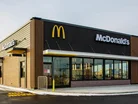Cloud Tech: Key to McDonald’s Digital Transformation

McDonald’s restaurants have been a familiar sight around the world for more than 65 years. What began as a single drive-in restaurant in San Bernardino, California, has grown into an iconic global fast food brand serving 63 million customers every day in 38,000 restaurants worldwide.
And the company is not standing still: McDonald’s announced in December 2023 that it was targeting expansion to 50,000 restaurants by 2027, ushering in the fastest period of growth in its history.
It is also looking to extend its loyalty programme – already one of the largest in the world – from 150 million to 250 million 90-day active users by 2027.
Central to the growth plans of McDonald’s is its digital transformation, the foundations for which it began to lay as far back as 2014, when it began partnering with major cloud providers.
By 2017, McDonald’s was migrating core and non-core applications out of physical data centres and into the realm of public cloud providers. The idea was to achieve scalability and agility, and form the backbone for future digital innovations.
In 2017, McDonald’s took a significant step in its digital and cloud journey by focusing on customer-facing mobile and digital offerings, with the introduction of the McDonald’s Global Mobile App. This enabled the integration of third-party delivery services, meaning customers could have meals delivered to their doorstep, thanks to cloud-powered logistics and services.
Director of McDonald’s Cloud Business Office, Betty Gomez, says one of the biggest challenges in migrating the company’s core applications to the cloud was ensuring data security, compliance and performance.
“Our Global Technology Infrastructure & Operations team and various product teams worked diligently to meet local regulatory requirements,” explains Gomez in a post on McDonald’s technical Blog. “This early focus on security set the tone, emphasising data protection throughout the journey.”
She goes on to say that migrating legacy systems out of data centres requires “thorough planning and detailed execution to avoid disruption”, adding: “This is particularly critical in our 24/7 business environment where the technology impacts restaurant operations.”
McDonald’s uses technology to unlock greater speed and efficiency
Today, McDonald’s is using technology to unlock speed and efficiency at scale, both for customers, restaurant teams and employees.
The company has made several acquisitions and formed partnerships with technology companies to advance its capabilities. In 2019 it acquired Dynamic Yield, a leader in personalisation and decision logic technology, to provide a more personalised ordering experience for its customers: later selling it to Mastercard.
And in December 2023, the company announced a strategic partnership with Google Cloud to connect the latest cloud technology and apply generative AI (Gen AI) solutions across its restaurants worldwide.
The aim is to accelerate innovation around automation from equipment manufacturers, and to allow restaurant general managers to be proactive in reducing business disruptions.
“We’re focused on making AI more helpful for everyone, with the potential to unlock many new opportunities for innovation,” said Sundar Pichai, CEO of Google and Alphabet. “The restaurant industry is already benefiting from these advances, and we’re excited to see how McDonald’s will use our generative AI, cloud, and edge computing tools to improve its iconic dining experience for employees and customers all over the world.”
McDonald’s also recently announced an expansion to its strategic partnership with Accenture to help it leverage edge technology and Gen AI solutions, as it seeks to hone operations and the customer-and-crew experience.
This phase of innovation will also see McDonald’s build a stronger technology team. Accenture is helping train and support the food giant’s global workforce by using Accenture’s learning and development programs, online training courses and boot camps for emerging talent to ensure the workforce has the AI, data and edge computing skills needed in the digital era.
“To unlock the opportunity in our ongoing digital investments, we chose Accenture, our long-time partner who has helped us build our digital foundation, to work with us on this next phase of innovation,” said Brian Rice, EVP & Global Chief Information Officer, McDonald's.
“Accenture’s deep understanding of our business, our industry, and of course technology, will allow us to leverage the full potential of the cloud and Gen AI solutions by implementing advanced practices to quickly leverage those technologies as well as to nurture and empower the talent within our organisation.
“Lifelong learning and digital upskilling are at the heart of our culture and long-term growth plans – and embedding this across our workforce will enable greater business agility and performance.”
Accenture CEO Julie Sweet said her teams are helping McDonald’s “reinvent the customer experience, stay ahead of its customers’ changing needs and reimagine what a restaurant can be”.
She added: “This work is a leading example across industries of innovating with tech data and AI at the core, across the cloud continuum, all the way to the edge.
“And we are doing so in a way that keeps people in the forefront, building the skills they need to meet and delight their customers in new ways every day.”
**************
Make sure you check out the latest edition of Food Digital and also sign up to our global conference series - Sustainability LIVE 2024
**************
Food Digital is a BizClik brand



